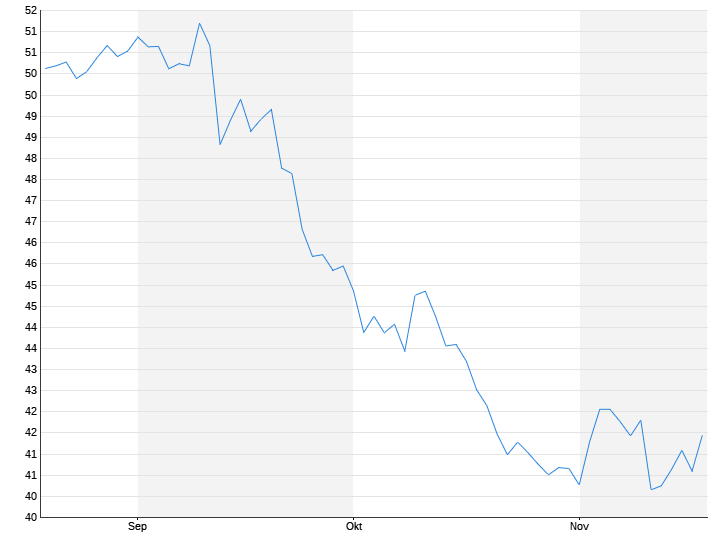A study flop is a disaster
Bayer shares with historic price crash
November 20, 2023, 11:03 a.m
Listen to article
This audio version was artificially generated. More info | Send feedback
Bayer loses another glyphosate trial in the USA. And now the company also has to stop a study on an important drug. Investors don’t like that at all. Bayer shares are falling to their lowest level in decades.
The recent streak of bad luck at the pharmaceutical and agricultural group Bayer continues. In addition to another setback in the glyphosate trials in the USA, the Leverkusen-based company is now also suffering a bitter defeat in research with its most important drug hopeful, Asundexian. Investors on the stock market reacted with shock. Bayer shares in the leading index Dax fell by almost 19 percent in early trading to a 14-1/2-year low. This is the biggest price fall in at least 32 years. As a result, the aspirin manufacturer’s market value shrank by around 7.6 billion euros.
“This is a severe setback for Bayer. Asundexian was the pearl in Bayer’s pharmaceutical pipeline and without the active ingredient, the pharmaceutical division will be left without sustainable growth,” said fund manager Markus Manns from major shareholder Union Investment. Creating a new beginning will be a Herculean task for CEO Bill Anderson.”
Bayer announced that night that it would prematurely terminate a crucial phase 3 study with Asundexian due to lack of effectiveness following the recommendation of an independent control committee. In the study involving 18,000 participants, the drug was examined in comparison to the anticoagulant Eliquis from competitors Bristol-Myers Squibb and Pfizer in patients with atrial fibrillation and at risk of stroke. The effectiveness of Asundexian was shown to be inferior compared to the control arm of the study. The company wants to further analyze the data to better understand the result.
For Bayer, the new anticoagulant is the greatest hope in its pharmaceutical research. According to previous information, the company believes that Asundexian alone has a peak sales potential of more than five billion euros, more than any of its other medications. Bayer did not want to comment on this forecast when asked. The drug should be ready for market in 2026 and, according to initial data, led to significantly lower bleeding rates than the competing product Eliquis.
It was only at the beginning of November that Bayer expanded the study program with the drug, which includes a total of almost 30,000 patients in over 40 countries. Recruitment of participants for this study for patients with atrial fibrillation without current treatment options with currently available anticoagulant tablets has not yet begun. It was actually intended to complement the study that has now been aborted. The phase 3 Stroke study with 9,300 test subjects, in which Asundexian is being tested for the prevention of ischemic stroke, will continue.
Bayer loses glyphosate trial again
Replenishment from the pharmaceutical pipeline is essential for the Leverkusen-based group, as the patents on its blockbusters – the anticoagulant Xarelto and the eye drug Eylea – expire in the middle of the decade. For a long time, analysts considered the pipeline to be too weak to be able to absorb the loss of sales after the top drugs’ patents expired. But with Asundexian the mood had changed. The now announced premature termination of the study comes as a complete surprise. Bayer’s pharmaceutical business is therefore facing considerable challenges, explained the analysts at Barclays.
There was more bad news from Bayer’s agricultural division at the weekend, as the company lost its fourth lawsuit in a row because of the alleged carcinogenic effects of its weed killer glyphosate. A jury in the US state of Missouri sentenced the company to pay a total of $1.56 billion to four plaintiffs. Bayer announced that it would appeal. “Unlike previous cases, the courts in the recent cases improperly allowed plaintiffs to misrepresent the regulatory and scientific facts.”
In October, Bayer suffered three defeats in a row in trials after Leverkusen had previously won nine trials in a row. Bayer has always rejected the allegations against glyphosate. Authorities worldwide have classified the drug as non-carcinogenic. The World Health Organization (WHO) cancer research agency IARC, however, rated the active ingredient as “probably carcinogenic” in 2015. Most recently, agreements were still pending for 52,000 of the total of around 165,000 registered claims.
